Wednesday, August 02, 2006
Today our diocese sent out this notice: "The second annual Biking for Lui will be Sept. 30 on the Katy Trail in St. Charles. The event sponsored by Trinity/St. Charles raises funds for the Diocese of Lui, where priests travel by bicycle between their congregations. After the ride, open to riders six and up, everyone is invited to Trinity, 318 S. Duchesne, for a wienie roast, hot chocolate, and s'mores. For more information, call (636) 949-0160. "
What a great idea!! Kudos to you, Trinity & Tamsen!
Friday, July 28, 2006
In late June, Sandy hosted a reunion of sorts for those of us who had been to Lui. The big, important trigger was that Deborah had finally returned from her six-month mission to Lui! And we all wanted to see her again and learn what she had experienced, and catch up on the Lui news.
So we all convened at Sandy's house in St. Louis, and it was wonderful to see again the people with whom I had travelled and sweated in Lui, plus those who had been on the trips before & after mine.
Deborah looked so good! And it was great to hear her updates on how things were going in Lui after we left. The rains had come at last! You can read Deb's blog entries at ADVENTure: Sarah's Laughter.
In that delightful evening together -- with so many people who had travelled to Lui -- I was moved again and again. We have all been changed by going to Lui. And we all now share a deep bond together.
I can only hope that our Diocese will keep sending others going to Lui -- and stimulating all our parishioners to remain mindful of Lui.
After coming home from Lui, I have had several opportunities to talk about that trip.
My first formal presentation to my parish was on the evening of April 6. The folks in my parish generously understood that I would need some time to “come back to earth” after that trip, so they didn't press me to a program too soon after my return. Instead, they gave me almost a month, to do an evening program as part of our Lenten series. I think this was a good program. By then, I had time to gather and sort my photographs. And I pulled together a PowerPoint presentation for them, which I would happily provide to others. We had a big potluck dinner, and something like 60 folks came – which is pretty wonderful, in a parish with an average Sunday attendance of 140. This was an important event for me, as it gave me a chance to talk with my parish about what was accomplished for all the gifts and money and sacrifices they had donated to make my trip possible.
On April 23, I got to do another parish presentation. My April 6 program was more “travelogue” – explaining to folks the nuts and bolts of my trip: how and where we traveled, where we slept, how we bathed, what we ate, who we met, what we did. This Sunday morning program involved all the adults and our middle/high school students, where I focused more on the spiritual insights of my trip. It made me think fleetingly that maybe I could be a preacher -- for a certainly did preach in that 45-minute session. One of the impressive things about the program was the attendance; some people came who are not even parishioners, but had read about my trip in the local newspaper.
I made a very different presentation on May 13. A priest friend of mine is active in Boy Scouts, and they were having Merit Badge University on May 13. He asked me to come into that weekend-long event to give them a program about my trip and Sudanese life. It was very different to talk with these boys about my time in Lui, but I did, and they seemed to be engaged with the story I told them. Of course, in that setting, I did not focus on the church events, but on the spiders and rats and lizards ... but the boys seemed to enjoy it. But I also was able to talk with them about the suffering and grim realities that the people of Lui are enduring, and what that means to us in the U.S. Drawing from that program, a group in Arkansas is now talking with me about doing a similar program for them.
The very next day, on May 14, I had the opportunity join with Rick (who was part of my mission) and Ida (who went on our diocese's next trip) to lead a session at the adult forum at Emmanuel/Webster Groves. We had a very good turn-out, and I was honored to talk to them, in company with Rick & Ida.
Here’s my only disappointment: We and the diocese have done our best to let all the parishes in our diocese know that we are available to make presentations and lead programs about our time in Lui. But sadly, very few parishes in our diocese have asked for us to come. We would come anywhere within our diocese – which means over 100 miles in many cases. But most of our parishes have not expressed interest in having a presentation about our diocese’s work in Lui. That is disappointing. And I don't know what it means for our companion relationship.
Miscellaneous Reflections
I woke early on Sunday morning -- my first morning back from Lui -- and had the opportunity to make several entries in my Lui journal. I wanted to be ready, in case they asked me to articulate any major themes about my journey. Here are the things that I flagged:
The people in Lui have two feet planted in the Iron Age and two hands reaching toward the 20th [not even the 21st] century:
§ Their "agricultural tools" are merely a hoe and stick
§ The women must spend hours per day grinding grain.
§ Water is 3 miles away -- and the well is nearly dry.
§ There's virtually no machinery ... and they have little understanding of how machinery works. So even assembling the treadle sewing machines was impossible for them ... until Deborah helped them.
§ News & communications travel only at the speed of a walking person or perhaps by bicycle -- much like the U.S. 200 years ago.
§ There's just one computer [an old 486] in the whole diocese of Lui - -powered by a generator and connected to e-mail thanks to a satellite phone from our diocese. But all those connections are very fragile and prone to breakdown. While Deborah's there, they have satellite phone connection to the wider world. But what connection will they have when she (and her phone) leaves?
I visited five villages/archdeaconries (beyond the village of Lui) in my time there:
Kedibah -- burned in September by the Dinka
Wandi -- where the women gave us/Robert a live bird
Mariba -- also destroyed by the Dinka -- where they're now rebuilding with grass, because they're no longer confident of the peace
Buigi
Nideh -- including healing prayers for children with nodding disease
Everywhere we went, people talked about how missionaries -- white people -- have come in the past, promising assistance, but never returned. Now the Diocese of Missouri has sent three groups in three years. And in one of our village talks, one old man said, "We have suffered war for 21 years, and have felt forgotten by the whole world. But now we think maybe we have real friends." We must keep our covenant with this man and this diocese!
Have I talked about their offerings during their worship? We Americans drop our checks and bills into a brass offering plate. But they do not have money. They give what they have: a handful of seeds, some leaves, a pretty rock. We give out of our abundance. But, truly, they give of their hearts.
One of the powerful things that hit me throughout this trip was the difference between being a relatively well-informed person -- one who lives and breathes NPR and PBS vs. one who really knows about the civil war -- who knows people who have had homes bombed, family members hacked to death, John conscripted at age 12 to serve in the SPLA.
Thursday, July 27, 2006
Father Bob & I arrived in St. Louis around 4:30 p.m. Saturday. To my great surprise, my sister & brother-in-law met me at the airport. Boy oh boy! It sure was wonderful to have family there to meet me! They drove me home, and stayed with me for several hours while I talked and talked and talked about Lui. It sure was helpful to have such good, kind, listening ears to ease me back into my regular life.
That was Saturday evening. I had scheduled my airline itinerary so that I could be home with my parish on Sunday. Though I got home pretty late Saturday, I woke early Sunday [thanks to the Lui time-zone-shift] and eagerly got ready to go to church in my own parish.
Going to church that Sunday was rather bizarre. I got ready as usual, parked as usual, walked in as usual. But as soon as I walked into the nave, I started crying. One dear friend, sitting in the back pew, saw me walking in and gave me a bear-hug, and then I really lost it – just crying and crying and crying. In my time in Lui, I had been vividly aware – much more than I would have anticipated – that folks in my parish were praying for me and bearing me up on those prayers. Being with them again on this Sunday was a most powerful affirmation and reunion. I was home at last, and humbled to be back with them.
Throughout our time together in Lui, our group had salivated about the fantasy of hot food and a cold beer. After we finished the meeting with the Lui representatives, we went back to the Methodist Guest House, then our driver was available to take us to dinner.
Strangely, we Americans in Nairobi, after visiting Sudan, had Chinese for dinner! How funny is that??? But our driver picked the restaurant. So … ok!
It’s really hard for me to talk about that last dinner in Africa with my traveling companions. We had shared so many experiences! And were so bonded! But I also knew that this was the end of that intense experience. I knew that – no matter how much we might wish it different – in the next 48 hours, we would all return to our individual worlds, and would never again feel as close as we had in the past 2 weeks. Sad for me, it was.
Father Bob & I had return plane tickets for that night. Archdeacon Robert, Sandy, and Rick had tickets to return on Saturday. So after dinner, the whole gang accompanied me and Father Bob to the Nairobi airport. We got there around 10 p.m. for our near-midnight departure.
I can’t talk much about those hugs and leave-takings. It was so hard and so sad to leave my companions there.
Then Father Bob & I had to just cool our heels in the Nairobi airport. Not long after we got into the airport, we saw the display saying our flight had been delayed. Oh well. We took turns – one of us wandering around the airport, while the other “kept the other’s seat.”
This struck me when we got into the plane. We had all the usual in-flight announcements, which nobody pays much attention to. But then I heard something different in the script, and began to pay attention. The flight crew was alerting us that – before we departed – they were going to do an industrial-strength “insecticide drop” throughout the aircraft. In other words, they were going to bomb us all with insecticide. They did it, and it wasn’t very noticeable. But it did make me aware again: there are a whole bunch of insects and parasites in Africa, which the First World does not want to have.
I’d like to just skip over the plane ride(s) and jump straight to our arrival in St. Louis. But I think other people have talked about the plane ride. So I guess I have to ‘fess up to it.
I had scarcely eaten anything in Nairobi – just a fried shrimp, a fried dumpling, and part of one beer. But about 30 minutes after our take-off from Nairobi, I realized I was feeling very, very bad. And got sick – projectile vomiting like a scene from The Exorcist. Aargh! It was so embarrassing. The flight attendants took care of it well, but I was seriously chagrined to have made such a mess.
I do wonder what was going-on gastro-intestinally. I had not eaten much. But I continued to have serious gastro-intestinal problems for about 48 hours after getting home. Maybe it’s those plates of salad I ate when we got into Nairobi (as some of my traveling companions opined). Or maybe it’s some bug I picked up. Whatever …. it was darn miserable.
Our flight home left from Nairobi around midnight on the night of 3 March, and we arrived home in St. Louis around 4:30 p.m. on Saturday, 4 March.
Fortunately, my sister and brother-in-law met my flight in St. Louis. I was amazed at how grateful I was to greet warm, friendly faces. Riding home with them, I talked and talked and talked with them – doing a heart-dump on my time in Lui. Folks who visit Lui in the future: be sure someone you love greets you at the airport and takes you home! For, when I returned, I was very eager to talk with others who had visited Lui or would be sympathetic to the trip.
Big day today. Bigger than I would have imagined. This was the day where we visitors from Missouri were to meet with representatives of the Diocese of Lui and some others the Bishop would invite. I expected it might be maybe us five Missouri visitors with Bishop Bullen and a couple of others from the Diocese of Lui. But no! There were at least 10 people from Lui in that close, hot room with us.
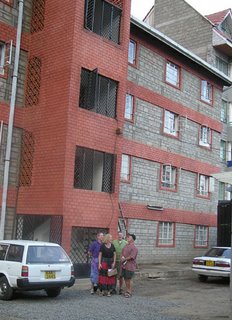 The Episcopal Diocese of Sudan maintains offices in this Nairobi building. Several other groups -- currently expatriated from Sudan -- also have space in this building, including the Roman Catholics of Sudan.
The Episcopal Diocese of Sudan maintains offices in this Nairobi building. Several other groups -- currently expatriated from Sudan -- also have space in this building, including the Roman Catholics of Sudan.In that very hot room with no breeze blowing [Did I mention it was hot?], these ten (or so) people from Lui explained their situation and talked with us about their needs. Others in the meeting surely took more thorough notes than I did. They impressed me with the depth of their needs and the urgent need for us to bring assistance as soon as possible.
This is a shot of about half the group:
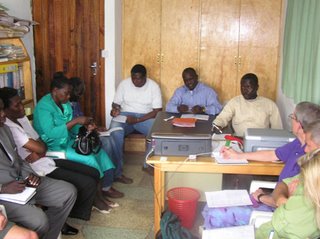
I think all – or least most – of these folks had moved from Lui to Nairobi. But that does pose a question and a challenge. When war came to Lui, many folks fled. I’m not sure what was involved in that flight. But I do sense – and so did others in our mission group – that the people back in Lui are starting to feel irritated by these people who are still hanging-out in Nairobi and other cities outside Sudan. While the Moru in Lui are suffering without power, water, or food, their compatriots – and some of the leaders of the non-governmental organizations – are living in Nairobi where they have vehicles, refrigeration, air-conditioning, power, and – more importantly – food, water, and schools. I sense that it’s the “elite class” and the educated people that fled to Nairobi and beyond when civil war began devastating Lui. But now – if Lui is going to be rebuilt – they really need to go home to Lui. But what would you do? Especially if you had children. Would you leave the relative comfort and safety of Nairobi to go home to the primitive conditions in Lui? I hope I would, but I can’t be sure. What will they do? And how can re-building really take hold in Lui if the more educated and affluent people don’t go home? There are no easy, facile answers to those questions. But they are the questions that we began to raise in our meeting with the “Lui leaders” in this session.
One of the men –with the Sudan Humanitarian Service – made a powerful statement in that regard. He said, “You see us here today in suits and ties, but we are refugees.” His comment hit home for me. These guys [and, yes, most of them in that session were men] have done their best to survive. But they do still feel homesick for Lui. They want to go home, and they want to help their people.
Education is a huge issue. Several of the Lui leaders mentioned it. There’s a terrible shortage of schools, and a problem with the quality of education offered in the few schools there are. One man mentioned that only 27% of school-age children in Lui are able to attend school. That’s a problem that we can and should address.
Health care is another big issue. Lui is fortunate to have the Samaritan’s Purse Hospital located there - -and thanks be to God that it’s there! But the travel logistics are so primitive that it takes many, many hours to carry a person to the hospital – carried on a person’s back, or maybe (if you’re lucky) on a bicycle. Strangely, transportation is the key issue that stands between the Moru and reasonable health care. There should be a way to deal with this!
Millennium Development Goals. This was strange to me. As an American, up to that time, I had heard very little about the UN’s MDGs. But a majority of the speakers that day spoke of the MDGs … what they promise … what needs to be done to achieve them in Sudan. Thanks be to God, and thanks to Michael Kinman, the Episcopal Church this year made a strong commitment to the MDGs. I hope their benefits will finally begin to make a significant difference in the lives of the people of Lui.
Agriculture. Several folks spoke about these problems. They recognize the soil is depleted. They’re getting sparser yields using the current, traditional methods and tools, but aren’t sure how to improve the situation. They have a desire to explore “agri-business” as a way to provide food sufficiency in Lui and generate income for the Diocese and the people, but not sure how to proceed. For instance, they have lots of mangoes, which arrive all at once, but many go to waste because they have no way to preserve or transport them. They sense there may be export options, but don’t even know how to begin exploring those.
It was somewhat overwhelming to hear all these people – one after another – list their needs, hopes, and problems. I wish had wise words to say here. But I don’t. I don’t feel we got any resolution about all these issues, nor that we charted a way that our companion relationship can move things forward. That was sad. Desperately disappointing. I just hope our diocese -- and the many other Episcopal dioceses and humanitarian groups operating in Sudan -- can begin to provide significant, sustainable development before the people of Lui despair or die.
Archdeacon Robert & Bishop Bullen had arranged for Sandy, Father Bob, and me to have a driver to take us shopping on Friday. Rick was supposed to meet with diocesan folks to review building plans and talk about how to build more durable structures.
When I awoke that morning, I finally did turn on the little television in my room. And I saw that it’s raining in Kenya. The people in Lui were so desperately in need of rain! And I paused in my morning preparations to pray again that the rains would move north, into Lui, to give them the rain they need so desperately.
Ambrose drove us to a market with lots of indigenous craftspeople. We had asked for this, instead of the capitalist retail shops.
As we drove through Nairobi, I was struck by the vegetation, which was amazingly lush.
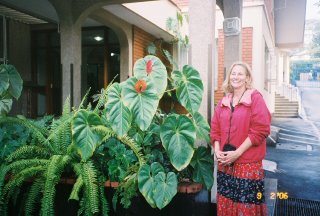 This is a photo just outside the Guest House.
This is a photo just outside the Guest House.There were some wonderful items in the market, but this was a hard experience for me. For the merchants were all but grabbing us and dragging us into their stalls. And I’m not good at doing those negotiations. In addition, the prices on the merchandise were merely suggestions, and haggling was the rule of the day. But I’m not a haggler.
However, I did buy a few items – including some earrings from this merchant.

At the end of our shopping spree, Ambrose drove us to lunch, where we hooked up with the other Missouri travelers, then went to the Diocesan headquarters.
There were so many other, more important observations to share about Lui that this one escaped my recollection ‘til just now.
The guys here walk around holding hands! I had been in Lui a while before I focused on this. One morning, when we were walking along the road to the Samaritan’s Purse chapel, I noticed two guys (probably in their late 20s) walking ahead of us, holding hands. When I asked, Deborah explained it to me. This starts in childhood, when boys are good friends. As I’ve observed before, the Moru are very much about physical contact. So it’s not even noteworthy that boys of school age will walk hand in hand. And this continues into and through adulthood. Guys walk around holding hands, and it’s not even noteworthy in Lui.
But that morning, walking along the road to chapel, it certain did jar me and my male companions. They immediately started making jokes to each other. (“Hey, bunkie! Wanna hold my hand?”) For no American man would hold another guy’s hand unless they were gay. It was like stepping through the looking glass.
No self-respecting straight guy in the U.S. would walk around holding hands with another man. But it is routine in Lui. These guys grow up together. They are friends. And holding hands does not mean they are gay or anything. It just signifies their friendship.
Interestingly, and in sharp contrast, I am told husbands do not ever walk with their wives – much less holding their hands! When men walk with their wives to church or market or wherever, the men would be considered [as the locals put it] “less a man” for showing any affection. So the men do not even walk alongside their wives. The men walk together, and women walk together.
Saturday, July 15, 2006
Methodist Guest House, Nairobi (2 March 2006; 10 p.m.)
We landed in Nairobi ca. 6:40 p.m. After days and days over 100 degrees, it was wonderful to feel (relatively) chilly, as a thunderstorm had just come over! I think the temperature was down in the 80sF, and it felt a marvelous relief!
We were driven to our lodgings – the Methodist Guest House, and we knew their dinner serving hours were coming to an end, so we did not have much time to waste, if we were going to have a meal.
In the previous 24 hours, we had begun to indulge in fantasies about the things we were looking forward to: showers, hot water, beer, vegetables . . . Now we were in Nairobi, which felt to us – after the basics in Lui – like the very apex of civilization, and we longed to experience those luxuries.
So we all dropped our stuff in our rooms in the Methodist Guest House, and washed hands. Wow! Were mine filthy!! Then everyone headed straight to dinner at the Guest House, and it was marvelous!
Dinner (buffet style) started with the warm pumpkin soup (actually tasted like squash) and it was delicious – subtle seasonings in a cream base.
Then I had a dinner plate full of salad. It was ordinary iceberg lettuce, which – in other times – I might have eschewed for more exotic greens; but on that evening, the iceberg lettuce was like a gift from God. I topped the lettuce with a scrumptious blend of ripe, juicy tomatoes, red onion, cucumbers, and a nice balsamic vinaigrette.
Then I had what they called sweet and sour pork (which were ribs in a wonderful ginger sauce), marvelous carrots and zucchini with a little butter sauce. The French fries were boring (cold). There was a bottle labeled “tomato sauce” which looked like andwas bottled like ketchup, but it was a strangely sweet jelly-like substance; it was easy to ignore after a few bites.
Then I was back to the buffet line for a second serving of those luscious ribs. Then back for a salad-plate of the salad again, which soothed my soul.
Oh, vegetables! Oh, seasonings!! I was in heaven!!
And we even had knives! and forks! and napkins! It was a banquet fit for a king, and we were all in very good spirits. [Mind you, we had not seen eating utensils – much less napkins – in our entire time in Lui.]
Reading these words now, four months after the fact, I wonder if it’s appropriate to talk in such sensual terms about what that meal was like. But I’m choosing to leave those words as I wrote them at the time. Maybe it’s some sort of idolatry to have such sensuous pleasure in the tastes and smells and textures of good food. But I do know it was an important moment, as I moved back from “Third World” toward “First World.”
Then the five of us went out to the patio and sat outside for an hour afterwards, drinking tea and visiting – and, as all through these days – lots and lots of laughter. Everyone seemed very relaxed.
I certainly can’t speak for the others, but this is what I was feeling. It felt wonderful to have gone through the experience with those folks, whom I had grown to love. We had seen and experienced things together that will bind them to me forever. But I also recognized that we were beginning to diverge and go our different ways and would never be together in quite that way again. So there was joy and communion and sadness, all crashing together for me.
I was sad to part from my “tukal-mate” Sandy, and Rick and Bob made “bunkie” jokes. But in a way, I’m sure we were all pleased, too, to have private space and solitude after 7 nights of sharing our tukals.
We had all been longing for, dreaming of, and fantasizing about having a toilet [not just a hole in the floor] and taking a long, hot shower in which we might actually get clean – without having to share that shower with bats, rats, lizards, roaches, and ants.
But by the time I hit the shower (nearly 10 p.m.), there wasn’t a sign of hot water. Oh well, I’d endured much worse! and was easily able to give God thanks for the showerhead and the water and the clean floor and walls.
 Here's a view of my modest room.
Here's a view of my modest room.In retrospect, I observe how grateful I was to eat regular (to me) food again. Strangely, I found I did not want to turn on television or use electric lights. On one hand, it was marvelous to check in to a room that had a tile (not just packed-earth) floor, with electricity and plumbing. But it was jarring, too. After so many days without “creature comforts,” it felt “wrong” somehow to dive back into those systems again. So I could not bring myself to use the electric lights or the television that night. But I sure did enjoy letting the water run over me in the shower.
Archdeacon Robert has kindly arranged with Ambrose [of Bishop Bullen’s staff] to provide a driver for Sandy, Father Bob, and me to go shopping in Nairobi tomorrow. I’m looking forward to that.
Friday, July 14, 2006
Loki to Nairobi, Part II (Thurs., 2 March 2006)
While we were on the ground in Loki, this image really caught my fancy. All during our time in Lui, we had taken “baths” with the least-possible amount of water. Folks call them “cup-baths” because you measure out the water in cups, not gallons. While we were on the ground in Loki, darned if I didn’t see a couple of guys giving a “cup bath” to an airplane near us!
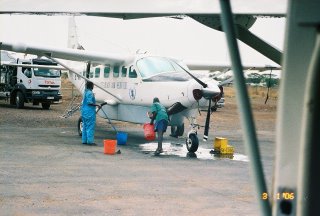
The fellow on the right is using a cup to toss water from the red bucket onto the plane, while the fellow on the left is scrubbing the plane.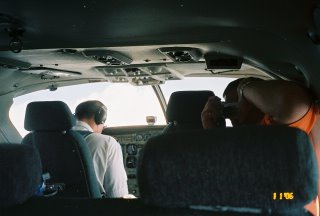 This photo of the cockpit and Captain Matthew may give a sense of how small the plane was. Archdeacon Robert is clicking photos.
This photo of the cockpit and Captain Matthew may give a sense of how small the plane was. Archdeacon Robert is clicking photos.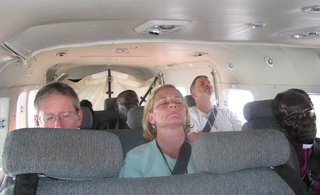
We were tired. Dog tired. Archdeacon Robert caught this image during our plane ride. Were folks sleeping? Praying? Meditating? I leave it to you to guess.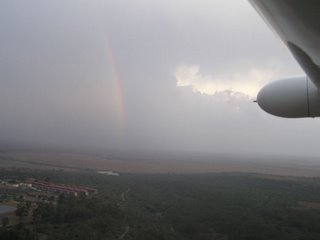 As we dodged the thunderstorm clouds flying into Nairobi, we saw a wonderful rainbow flying into Nairobi – just like Sandy’s group did two years ago. They took it then as a sign of hope for Sudan – a reminder of God’s covenant with the people of Lui – and we got excited in the same way. This photo from Archdeacon Robert captures the rainbow we saw from the plane.
As we dodged the thunderstorm clouds flying into Nairobi, we saw a wonderful rainbow flying into Nairobi – just like Sandy’s group did two years ago. They took it then as a sign of hope for Sudan – a reminder of God’s covenant with the people of Lui – and we got excited in the same way. This photo from Archdeacon Robert captures the rainbow we saw from the plane.
Everyone of us, when we saw that rain and the rainbow, immediately thought of Lui and prayed this rain would move on north, to Lui. They need the rains so desperately!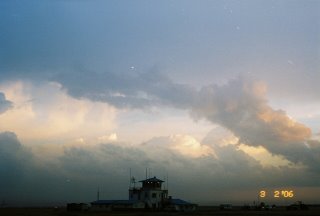 The thunderheads were still overhead when we landed in Nairobi.
The thunderheads were still overhead when we landed in Nairobi.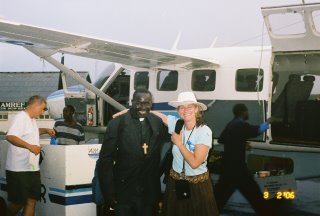 Manyagugu and Sandy were happy to land safely!
Manyagugu and Sandy were happy to land safely!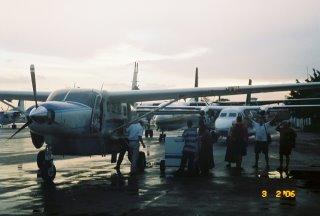
After so many days of heat and drought, we were delirious to touch down and feel chilly [the temperature was below 80F] and see the aftermath of a thunderstorm!
We landed at Loki around 3:45 p.m., and wheels-up to Nairobi at 4:15. We should arrive Nairobi about 6:30p, according to Matthew, the AIMAir pilot.
Before we made this trip, I asked Archdeacon Robert about what would be my role. Others had obvious roles: Bishop’s representative (Robert), priest & youth leader (Father Bob), carpenter (Rick), educator and Companion Diocese Committee rep (Sandy). In our pre-trip meeting, I inquired about my role – feeling very strongly that I had no obvious one. At that early stage, Robert glibly quipped, “At the end of the trip, you’ll know why you’ve come.”
I thought about his words many times all through the trip. I never did feel I had a clear use -- never did feel that I brought an obvious or meaningful asset to the mission.
But as Sandy & I were talking on this plane ride, one fact about my "purpose" hit me like a ton of bricks. It’s not just that I and the whole team saw the snare of materialism, consumerism, and spiritual poverty of our culture. It was more personal for me: I saw the selfishness that has pervaded my life. It’s all been about me, my , and mine. Early on in the time in Lui, Sandy started kidding me about being “Martha” because of my organization and homey touches in the tukel. But after a couple of days, I became aware I was unconsciously adopting the Biblical “Martha” role. Checking that people took their medications. Patiently "hanging-back" when I was so hungry that I wanted to run to the head of the line to eat our meals in the compound. Consciously trying to talk less and listen more. Telling team members things I value about them. And mostly this role was not hard. It was deeply, profoundly satisfying.
At this moment -- suspended between the struggling, suffering life of Lui behind me and the return to the U.S. looming ahead of me -- I feel more humble than I can recall ever feeling in my life – because for once, it’s not about me. It’s been about my team and the Moru people.
I feel a sense of gratitude – genuine and profound – that I cannot remember ever feeling before. Grateful for tiny things – like Robert buying us Diet Pepsi’s in Loki. Grateful for the cool air blowing in the plane. Immensely grateful for these people’s friendship.
And I feel now even more strongly – though I have felt it often during the trip – that I know I am being held up in prayer by my friends, my parish, my family. Only the Holy Spirit could have done this. This is not me!
Please God, please, strengthen me to sustain this attitude, this perspective when I get home. The Moru have taught me: It’s all about servanthood. Jesus taught that too. But it seems I only “got it” by going halfway around the world and meeting desperately poor people who would wash my hands with water when they are dying of thirst, would give me food when they’re dying of hunger, who would attend to our needs as if we were Christ himself.
I'm reminded of the Bible passage -- in Paul's letter to the Romans, I think -- about the fact that Jesus, though being in the form of God, did not presume to be the equal of God, but put on the form of a servant. That is the model we need to emulate.
It’s not usual for me to awake early – but I did so on this last day in Lui. I came awake around 5:45 a.m., so I was up and about before anyone else in the compound. It was still very dark, since dawn doesn’t arrive until ca. 7:00 a.m. So I got to enjoy the beautiful, starry night sky one last time. The sky here is awesome – You can see the entire Milky Way stretching from the northern to southern extremes of the sky. The Southern Cross was no longer visible, but we have seen it low in the south sky every night.
I sat out on the grass in my shorts, just enjoying the quiet and having a smoke, for quite a while.
We just do not have that quality of quiet at home. There’s not a single mechanical noise (except for the occasional, rare vehicle) in Lui. And the sounds are natural – roosters, goats, chickens, pots and kettles beginning to clatter as women begin to heat water and cook, the wing rustling the palms.
Gradually, my companions began to awake early on Thursday, in order to be ready for our truck ride to Mundri airstrip. Poor stupid Americans! We had been told we would depart “first thing” Thursday, but some of us forgot we were operating on East Africa time! But Simon eventually showed up with the Land Rover to take us to the airstrip.
I don’t know about the other travelers on our trip, but somehow it had not really hit me with full force that we would be leaving Deborah behind, and how painful that would be. She had been our wonderful companion and “cultural translator” all through our time in Lui, and it pained me to realize what she was enduring there.
The parting from our Lui friends happened way too fast! – and especially my too-sudden and too-short hug with Deborah, who would be staying in Lui for about three more months.
In that moment, it was vividly clear to me that we were heading to the safety of the U.S., and we were leaving friends in Lui, who might or might not survive the drought and hunger that was raging in Lui.
We piled into the truck for the trip to the Mundri airstrip. As usual, the trip was miserable, with all the bouncing and heat of the trip. We arrived at the Mundri airstrip, and my thermometer topped-out at its maximum temperature of 120 degrees.

Upon our departure from the Mundri airstrip, I observed something that I had failed to note when we arrived there. The arriving NGO plane was laden-down with goods coming from the U.S. and elsewhere – boxes and boxes full of goods bound for Lui: food, clothing, supplies. Rick, Father Bob, and Archdeacon Robert almost immediately formed a "human chain" to help unload all these goods.
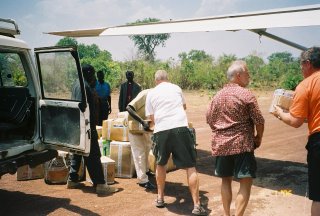
Among those items were 4 sewing machines that had been sent from Sandy’s parish in St. Louis; they had been shipped from St. Louis well before our group departed, but had not arrived by the time we did. Sandy had been quietly, intently worried about their whereabouts. It was joyful to see them arrive before we left. Here, Sandy points proudly to the boxes that were finally arriving in Lui from her home parish.
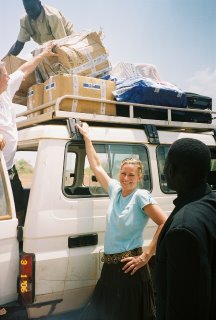 I'm not entirely sure of the timing, but I think Sandy's parish had sent those boxes via UPS something like 6 weeks before! It's hard for me to realize how long and arduous mail service can be.
I'm not entirely sure of the timing, but I think Sandy's parish had sent those boxes via UPS something like 6 weeks before! It's hard for me to realize how long and arduous mail service can be.And then I realized that the same thing had happened when we arrived in Lui. There had been a similar off-loading. I had just been too jet-lagged and culturally-bombarded to notice it. On this day, as on all the others when the little charter planes arrive in Lui, goods make their way into Lui. Not enough of them, for the needs are outstripping our knowledge and awareness. But they are an important signal of the folks in our diocese reaching out to the diocese of Lui.
We took off from Mundri ca. 2p, descending into Loki ca. 3:35p.
On the plane were the five members of our mission team, plus the Bishop and Rebekah, and one other person leaving from Lui: Darius, known as “Manyagugu.” He’s a young priest of the diocese, and was traveling with us to Nairobi to attend school to become a mechanic – a skill that is much needed in Lui. The poor man! None of us thought much of the plane trip, and he was calm and quiet. But he had a tough time with the flight, and we realized eventually that this was the first time he had ever been on an airplane. Mind you, a tiny jet like this one is not so calm as a big commercial airliner. He bore it with remarkable good grace. Here he is, after surviving that flight.
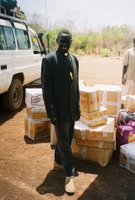
Hiatus – July 14, 2006
I’m not entirely sure why I have taken a 5-week hiatus from writing here, but I have one suspicion.
When I first began writing here, my head and heart were full of powerful recollections and reflections about the time in Lui. I was eager to “get it all down” so that others could sense some of what we saw and did and felt and experienced. But as I get closer to telling about the end of that journey, it becomes more difficult to recall and to relate. The more I try to write, the more I become aware that no narrative can faithfully capture the reality of that experience. One just has to be there to understand that world.
Now, with four months having passed since returning from Lui, I am more aware than ever of how poor my words are.
But I'll do my best to try to tell the rest of the story of my time in Africa.
Tuesday, June 06, 2006
Few people in Lui wear watches. The rhythms are much more natural. You eat an hour or two after waking. You eat again at mid-day, and then again an hour or so after dark. When it’s time for a meeting or for church, somebody begins sounding a drum and folks head to the event. Greeting one another on the pathway is much more important than being “on time.”
The other day in Mariba, the Bishop used what is apparently a catch-phrase around here: “Food first” – i.e., it’s foundational to any other development. We must attend to that issue first. Sustainable development requires that we help the Moru people develop food-sufficiency as a foundation for everything else.
But in another way the Bishop is wrong. From what I experienced among the Moru, it’s not really "Food first." For the Moru, it’s people first. Despite their hunger. Despite their thirst. It’s people. Relationship. A warm handshake that is firm and lasts a long time while you begin to talk. I'm astonished at the primacy they give to relationships.
The Lui boreholes are going dry. Folks come early in the morning and pump out what water is there. Then they sit and wait 3-4 hours for more water to trickle into the bottom of the borehole from nearby aquifers. A bit of rain would help Lui so much!
But we are also hearing that cholera outbreaks are appearing in Juba, because it’s nearer to the river and rains are coming there. The Samaritan’s Purse Hospital in Lui is preparing for cholera. They will open and operate a separate, quarantined facility to deal with cholera victims if they come this way.
Though we pray for rain to come of Lui, we have learned that would also bring an increase of water-borne diseases like cholera. Sometimes it feels like these folks just can’t catch a break!
This morning crawling out of bed before daylight, I slipped into my sandals, and was fumbling around for flashlight and eyeglasses. Unfortunately, I heard a dull crunch under my sandal, praying it was just an earring. But, no, it was my glasses. One of the eyepieces now sticks out at a jaunty angle that doesn’t really fit on my head anymore. I can’t really use my glasses now.
But it didn’t get me all bummed out. Instinctively and immediately, I was grateful I didn’t shatter a lens. The glasses are wearable, and I can get the frames fixed when I get home next week.
That’s just another of the many ways in which I’m realizing that I am lucky to be going home. My glasses got broken. But I can get them fixed next week. Unlike the people of Lui – who either don’t have glasses, or have no way to get them fixed.
It’s not usual for me to awake early – but I did so on this last day in Lui. I came awake around 5:45 a.m., so I was up and about before anyone else in the compound. It was still very dark, since dawn doesn’t arrive until ca. 7:00 a.m. So I got to enjoy the beautiful, starry night sky one last time. The sky here is awesome! You can see the entire Milky Way stretching from the northern to southern extremes of the sky. The Southern Cross was no longer visible, but we have seen it low in the south sky every night.
I sat out on the grass in my shorts, just enjoying the quiet and having a smoke, for quite a while.
We just do not have that quality of quiet at home. There’s not a single mechanical noise (except for the occasional, rare vehicle) in Lui. And the sounds are natural – roosters, goats, chickens, pots and kettles beginning to clatter as women begin to heat water and cook, the wing rustling the palms.
Gradually, my companions began to awake early on Thursday, in order to be ready for our truck ride to Mundri airstrip. Poor stupid Americans! We had been told we would depart “first thing” Thursday, but some of us forgot we were operating on East Africa time! But Simon eventually showed up with the Land Rover to take us to the airstrip.
I don’t know about the other travelers on our trip, but somehow it had not registered to me that we would be leaving Deborah behind. The parting from our Lui friends happened way too fast! – and especially my too-sudden and too-short hug with Deborah, who would be staying in Lui for about three more months.
Then there were the hugs and leave-takings with our friends in Lui. It all happened too fast! In that moment, it was vividly clear to me that we were heading to the safety of the U.S., and we were leaving friends in Lui, who might or might not survive the drought and hunger that was raging in Lui.
We piled into the truck for the trip to the Mundri airstrip. As usual, the trip was miserable, with all the bouncing and heat of the trip. We arrived at the Mundri airstrip, and my thermometer topped-out at its maximum temperature of 120 degrees.
We took off from Mundri ca. 2p, descending into Loki ca. 3:35p
Monday, June 05, 2006
I didn't realize we would have a significant “diplomatic event” on our last day in Lui, but we had one. Late in the day – a couple of hours before sunset – we were all summoned into one of the large meeting houses (“payuts”) and found that the leaders of the Lui community had gathered there – priests, deacons, tribal leaders, Mothers’ Union. The Bishop was there, along with the Dean of the Cathedral, as was the local leader of the SPLA.
It’s really not fair to say we had “no” warning. We knew there was going to be some sort of wrap-up. I just did not realize how many of the local leaders were going to be present. And that's why I have no photographs of this event: It felt too important to take pictures.
And I was so absorbed in this meeting that I did not make many journal-notes about it. Everyone in Lui made a statement about what they worried about, what hopes they had experienced in our visit with them, and what they hoped for the future of the relationship between the Diocese of Lui and the Diocese of Missouri.
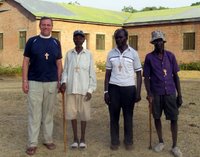 Archdeacon Robert, the village mayor, Bishop Bullen, and the Moru tribal chief were among the people who participated in the meeting.
Archdeacon Robert, the village mayor, Bishop Bullen, and the Moru tribal chief were among the people who participated in the meeting.I was overwhelmed by the strength of their statements. Clearly, they hoped and/or believed that our presence there was a promise for ongoing commitment. I found myself -- then as now -- hoping and praying that our Diocese will come through.
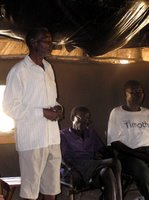
Several of the people stood up to challenge us -- saying that they have heard promises like ours before, and are waiting to see if we will really follow through.
This was a very ceremonial gathering. Rick presented to them the crosses he had made from Missouri oak. This was most welcome – as many of the clergy in Lui did not have crosses. That was a blessed gift to observe.
A couple from my parish had written a book, Gospels in Glass,
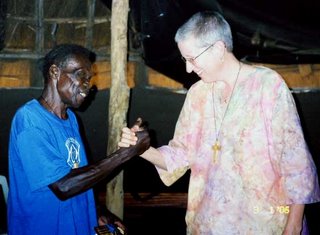 detailing stained-glass windows in the mid-Missouri area, and they had sent me to Lui with that book, in hopes of presenting it to the Lui diocese. In that final meeting with the Lui folks, I finally got a chance to present that book to Morris, who is the archivist and historian of Lui.
detailing stained-glass windows in the mid-Missouri area, and they had sent me to Lui with that book, in hopes of presenting it to the Lui diocese. In that final meeting with the Lui folks, I finally got a chance to present that book to Morris, who is the archivist and historian of Lui.At the end of the meeting, three of the women presented Lui gifts to us. To Sandy and Deborah they gave small baskets. When they presented my gift, they said something about my being “strong woman” and placed the basket on my head like a hat, instead of handing me a basket.
I was very grateful for this gift from these women, since Simon had told me earlier that I was “a dead family” because of being a single woman. Gender roles are very complex in Lui. I did not begin to explore them during my time there.
Friday, May 05, 2006
All through our week in Lui, Deborah had told us that the Mother’s Union had been working very, very hard to make crafts that we might buy. They had been preparing various crafts – sewing, pottery, and basketry – to sell to us.
Operating on “East Africa Time” as we were, we had remained very relaxed about when we would have that “market opportunity.” That's the reason we took our Lui "walk-about," which I have already described.
As the day wore on, we kept asking when the craft fair would begin, for we were eager to see the crafts the Lui women had prepared. We were eager to see their crafts, mostly because this would be one of our few opportunities to support what is emerging as their “economy.” It was clear to us that the Mother’s Union was looking forward to that opportunity. I never did get complete clarity about where the proceeds of that market would go. I gather it would fund schools (which the Mother’s Union supports) and support of the Cathedral. I’m not sure what else it would support.
We were trying to remain relaxed as we were operating on “East Africa Time” and did not want to rush the Mothers' Union. It was pretty funny. We kept asking, “When??” And again and again we were told, “Soon.”
Finally, though, we were told that they were ready, and the craft market was open.
We did not knock each other down. But we certainly were eager to outrun and outbid and outbuy each other. It was like a competition for who could spend the most money in support of our Lui friends.
It’s not like they had hundreds of items for us. There weren’t hundreds; maybe there were 5 dozen items. But it was clear to me that the items they offered were made with careful craftsmanship.
This photo probably requires some explanation. I’m a fool for pottery, and I love this photo. As soon as I arrived at their craft fair, I was drawn to this lovely bowl.
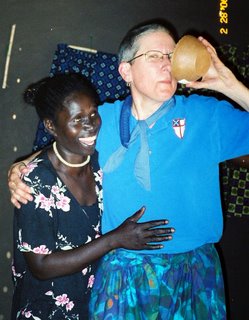 I loved it for its own aesthetic qualities, but also asked Varina how the Moru would use this bowl. She explained that you would fill it with food, then drink the juices. We took this photo. She said I should put food in it, and "chow down" -- and to illustrate the point, she rubbed my belly while I demonstrated the "chow-down" purpose of the bowl. At the moment – when the photo was taken – it was just funny.
I loved it for its own aesthetic qualities, but also asked Varina how the Moru would use this bowl. She explained that you would fill it with food, then drink the juices. We took this photo. She said I should put food in it, and "chow down" -- and to illustrate the point, she rubbed my belly while I demonstrated the "chow-down" purpose of the bowl. At the moment – when the photo was taken – it was just funny.Now, I have that bowl sitting in my house. And it always humbles me. Every time I look at it, I am reminded that I have more food than I need, and that this Moru woman -- who took such delight in imagining how I would use it back home -- is still hungry. She may be among the many people in Lui who are starving today. All of a sudden, this memory is not so amusing.
Thanks to the work Deborah has done with the Moru women – and introducing them to the sewing machine – there were also some nice dresses and skirts.
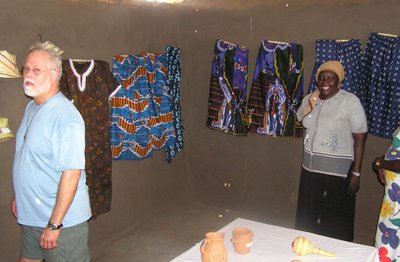 Sandy was happy to get one of their prize creations. And the Lui women showed her how to tie the headdress.
Sandy was happy to get one of their prize creations. And the Lui women showed her how to tie the headdress.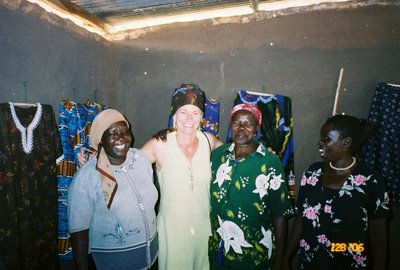
Varina had made a skirt that caught my eye.
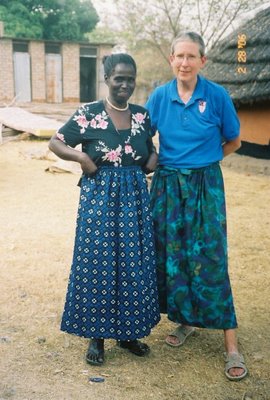
She and I talked, and I wanted to take that skirt home to my priest. Varina was very excited that I had a woman as my priest, and was happy to send that skirt home with me to the U.S.
They had prepared many woven goods – especially baskets. All of us wanted to take a basket home.
Most of the baskets were woven of palm or sorghum grass. The craftsmanship there was impressive. I think all of us came away with at least one basket.
One item that particularly caught our attention was a woven mat, made of the materials and in the pattern that the Moru used at church when they knelt at the Eucharist. Here it is, displayed at Rick's right.
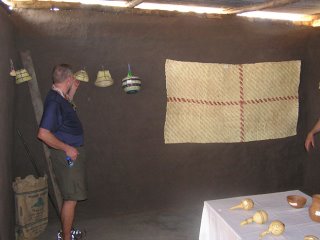
We quickly decided we wanted to buy it for Deborah, who has been living in Lui for several months with a hard-packed dirt floor in her tukal. We loved the idea that Deborah would finally get to have a palm floor for her tukel instead of the dirt floor.
I expect that when someone has lived among the Moru for as long as Deborah did, you probably get used to the fact that there are no "floors" as we think of them. But at that time and in that place, if felt to us like a special gift to give Deborah a "floor" to stand upon.
So we bought it, and had great fun presenting it to Deborah that evening, on our last night in Lui.
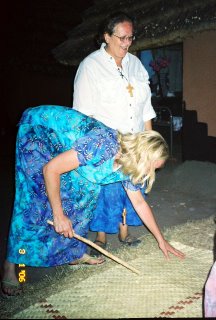
And here it is
 in Deborah’s tukal.
in Deborah’s tukal.Not too long after we got home, I saw one of Deborah’s blog entries, which told us what became of that palm mat. A group of women and children had been victimized by tribal warfare, and needed a warm, dry place to rest. Deborah gave them that palm mat to sleep on and give them protection from the hard ground. I cannot express how happy I am to learn of the use Deborah made of that simple mat. I could not have been more happy about the mat’s use!
And it made me realize: When we gave that mat to Deborah, we thought it would be a nice “creature-comfort” for her – to give her some protection against the hard-packed dirt floor. But it turned out that it gave some women and children some comfort against death and violence. I am glad it was useful.
The next day -- after the "craft fair" -- Deborah announced to all the village elders and diocesan leaders how much we had contributed to Lui through that craft fair. If memory serves, we had contributed over 400,000 Ugandan dollars. That’s enough to send more than 50 children to school for a semester!
A reminder to you blog-readers. The primary reason for this blog is to help folks understand what life is like in Lui, and what insights some travelers gained by spending with our friends in Lui. A secondary reason is for us to inform future travelers to Lui about what they might want to do, take, observe, etc. when they go to Lui.
Only after I had been in Lui did I realize there were a couple more things that I’d take to Lui if I get the chance to return.
Because there is no electricity in Lui, we had been forewarned to take our own light sources to Lui. The wind-up flashlights were very useful. (The ones now for sale at Walgreen's for about $15 had an incredibly long life.) I also took one of those “miner-type” flashlights that you wear on your head if you're caving; it was especially useful when I used the latrine at night and needed my hands free. But best of all, for some reason I had thought to take taper candles. They were wonderful in the tukal at night. They gave off much gentler light than the lanterns and flashlights did. I would put water or sand in the bottom of a water-bottle, then stick the candle in the opening of that bottle. This was my most satisfactory way to keep my tukal illuminated – much better than the flashlights that use toxic batteries.
And I would take a washcloth! When I was packing, I was trying to “minimalize” everything – to take as few items and as few ounces as I could. Consequently, I took a bar of low-sudsing soap I could use both for my hair and for my body. (I got a bar of Dr. Brawner's.) I certainly did not take a washcloth or body-sponge, because I thought those would be indulgences. Big mistake! With the dry, dusty, red soil that was everywhere in Lui – in my body and in my mouth and nose -- I got so filthy that just having my hand and a bar of soap did not get me as clean as I would have wished. If I ever return, I’ll take something that will help me to abrasively clean-off the red Lui dirt – especially from my hands and feet.
And let’s talk about chairs … or seats. In many places in Lui, the only seat is a tree-trunk. In most places there are hideous WalMart-type plastic chairs. Given those options, after hours and hours of sitting, the better option often (for me, at least) was the ground. If I were going back to Lui, I would make for myself one of those “sit-upons” that I used in Girl Scouts those many decades ago. I don’t have a lot of padding on my backside, and the hours on the barely-padded truck seats and the not-at-all-padded plastic chairs sitting around in Lui had my backside quite sore. Many times, I eschewed the plastic chairs and just sat on the bare earth. Next time, a “sit-upon-style” cushion will be going with me to Lui.
Your mileage may vary, of course!
On this last full day in Lui, I was surely paying more attention to some of the little details of “life in Lui.” One point that struck me was the laundry. I have already written about how the Moru (apparently gladly) do our washing, and I have documented how they dry clothes by tossing them over their bamboo fences.
But what shocked me even more was the fact that they not only wash our clothes – they iron them, too. They even iron things we would not consider ironing, like t-shirts or polo shirts.
The iron they use is probably about like one my great-grandmother would have used in the early 20th century. It’s made of iron, and is very heavy. Where our irons now have an electrically-heated plate, they have a “reservoir” in which they put hot coals from the fires they used to cook our food and heat our water.
And the ironing is done by the young men who cared for us in the compound. I never saw a woman ironing. That was a surprising cultural/gender-role difference to me.
The young man I saw ironing most of the time was Alex, probably in his late teens or early 20s. He was very quiet and reserved. Deborah told us his story. Apparently his mother died in childbirth. Alex was very fragile, and it was uncertain whether he would survive. But also, for reasons I do not understand, his father also fell quite ill about the time of Alex’s birth, and both Alex and his father were in the hospital in Lui. Sosten (one of the Lui priests) was visiting Alex and his father, and the father – recognizing he was about to die – placed the baby Alex in Sosten’s hands, and said, “I give this baby to the Church.” And the father died shortly thereafter. Ever since then, Alex has worked for the church and has been cared-for by the church.
This story was another that took my breath away! We dedicate our children to the Lord, especially when we baptize them. But what an experience, to be dying, and to place your one and only child in the hands of the Church! And what a ministry – for the Church in Lui to have raised this boy as its own ever since.
What wondrous love is this? ….
It’s hard for me to wrap my head around this. There have been no schools operating in Lui for more than two decades. Because the civil war closed them down.
When the Khartoum government from the north began attacking the southern regions like Lui, they attacked the schools and churches first. I gather they were trying to destroy the fundamental structures of the life in the south.
So … for over two decades … no schools have been able to operate.
Now that a provisional peace has come in to Lui, they are trying to restore schooling. This is one of the schools that Lui had established.
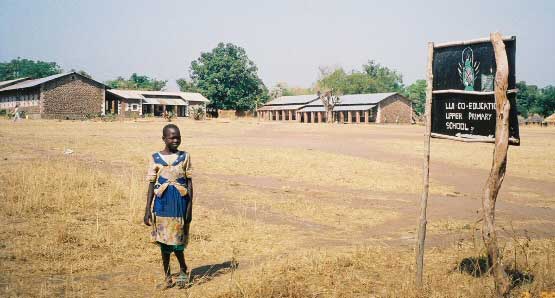
The children throng into these schools. They are very eager to attend school.
But here’s one thing that was heart-breaking to us. When we were there, the drought was devastating. It was so devastating that they had to close the schools, because there was no water for the children. Think of how we have to close school here when there’s a bad snow- or ice-storm. But in Lui, it’s because of a lack of water.
On February 27, we visited the village of Kedibah, which was one of the villages that was burned-out by the Dinka last fall. The burned many buildings in the village, including the school. This picture was captured by Archdeacon Robert.
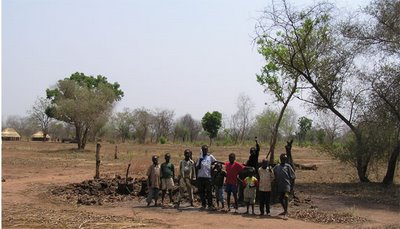 In the background is the burned-out school building. When we came to the village and Archdeacon Robert walked across to the school, these children gathered in front of the school remnants. They are so eager to see another school built here! And they believe we are going to rebuild schools here.
In the background is the burned-out school building. When we came to the village and Archdeacon Robert walked across to the school, these children gathered in front of the school remnants. They are so eager to see another school built here! And they believe we are going to rebuild schools here.Will we build them? The children are waiting.
Thursday, April 20, 2006
I know that Father Bob has had a whole series of articles published in his local newspaper, because he has copied them here.
My local paper has also published an article about my trip to Lui. It's currently at the News-Tribune website.
I'm very happy to have that publicity, if it will make folks in my region more aware of the issues confronting folks in Africa.
On the other hand, I do need to offer some "notes of exception" to that news article.
First, as most of you know, I was not there for a month; it was only twelve days. Since I provided the reporter with a copy of our itinerary, I’m not sure how she made that error. But there you have it.
Second, I regret that the reporter did not key in on a theme that was very much a focus of my comments: namely, the role that my local parish, other friends, and family provided in supporting me before (with encouragement and funds), during (with prayer), and after (with interest and patience) the trip. What she also failed to note is that the book (Gospels in Glass) I’m handing to Morris in one of the photos was written by two of our parishioners, and it includes two of Grace’s own stained-glass windows. I really liked leaving that memento in Lui – a particularly special gift from Grace to Lui.
Finally, there’s the contrast between my story and that of the other woman in the article. Folks here tell me they perceive a clear distinction between why she and I went on our mission trips and between what she and I took away from those trips. Our diocesan group did not go to southern Sudan to “convert the heathens.” Our two Episcopal dioceses (Missouri and Lui) are in the process of finalizing a “covenant agreement” to specify how we will assist and support one another. I have no doubt that I took away from that trip much more than I contributed.
All that said, the article is not bad. And, with any luck, it might make some folks think more deeply about the situation confronting our friends in Africa.
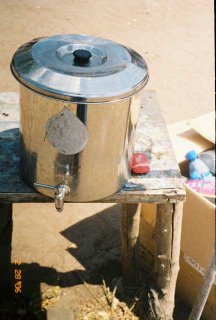 While we were in the Lui compound, it was clear that sanitation was important. This little stand became very important to us.
While we were in the Lui compound, it was clear that sanitation was important. This little stand became very important to us.The people of Lui observed careful hand-shaking rituals, depending on whether one's hands were clean or not.
The Moru kept this pot topped off with water so that we could wash our hands frequently. You’ll also notice the bar of soap at the right.
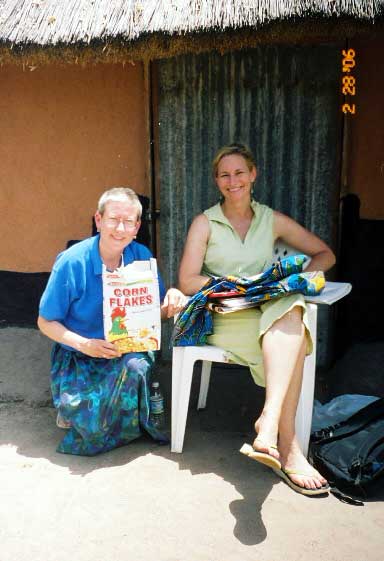
Breakfast
When we first arrived in Lui, the Moru worked hard to make nice breakfasts for us. But I think they figured out that we were not big breakfast eaters. Mostly, we just wanted our coffee!
So they seemed to slack off – which was more than OK with us!
Eventually, we realized they were leaving mostly cereals for our breakfast. Uncle Russell, this one’s for you! Corn Flakes made their way to Lui. I don’t expect anybody outside of my family to understand this photo.
I’m not sure why we got more reflective and photographic on Wednesday. No, that’s not true. I think I do know why we did that. I think it’s because we knew we were going to be leaving Lui the next day. And so we wanted to capture the experience, the perceptions, the odd little moments. We captured strange little odds and ends.
Because the lack of a vehicle made Wednesday odd, we had more time to pay attention to our village life.
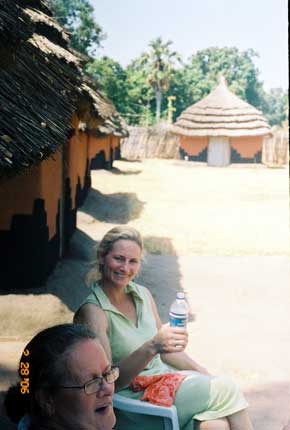 Sandy and Deborah got some relaxing time.
Sandy and Deborah got some relaxing time. This is the “VIP Tukal,” where Archdeacon Robert stayed. I understand it's also the tukal where our Bishop stays when he goes to Lui. Probably that's because it’s the largest tukal. But, ironically, it’s also the tukal that’s closest to the latrines. So .. nobless oblige, I suppose.
This is the “VIP Tukal,” where Archdeacon Robert stayed. I understand it's also the tukal where our Bishop stays when he goes to Lui. Probably that's because it’s the largest tukal. But, ironically, it’s also the tukal that’s closest to the latrines. So .. nobless oblige, I suppose.I caught a shot of Deborah with Anna, the woman who had done the bulk of our cooking. Even when we tried to thank her, she was just too modest to stay with us for very long.
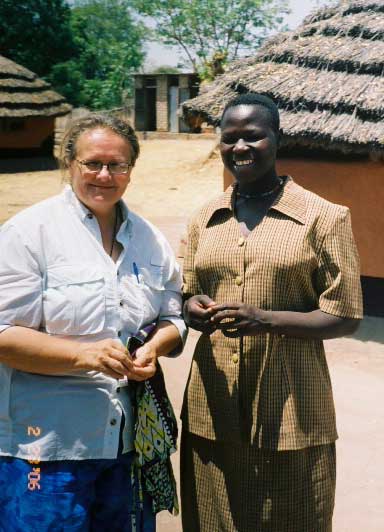
Lui has a carpenter. There are no WalMarts or Lowes or Ikeas in Lui. If you need something built, you must have it built it Lui. If I understand correctly, this is the shop of the one and only carpenter in Lui.
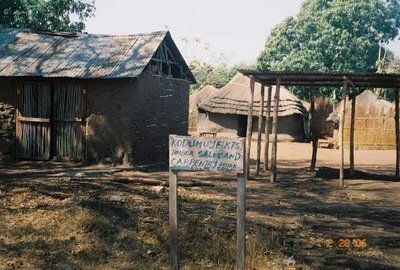
Our builder and carpenter, Rick, got the chance to visit with him. I hope Rick will “chime in” here with his observations.
Our Rick in front of the carpenter’s shop.
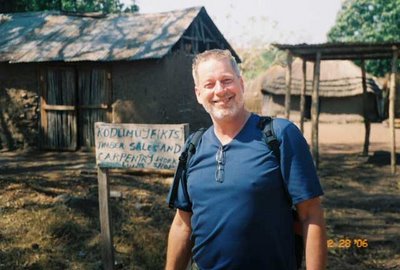
I'm sure Rick will not tell this himself, so I'll put it here in the blog until Rick sees it and makes me remove it. I think Rick is probably a very big contractor in his urban area. And I think one reason he was invited on this trip is that the people of Lui wanted advice about building and construction. Rick would have been well justified in introducing himself as a big contractor. But that's not what he did. All over Lui, wherever he went and whomever he met, he simply introduced himself as "a carpenter." I was touched and inspired by his humility.
Rick, my brother, you were an inspiration to me!
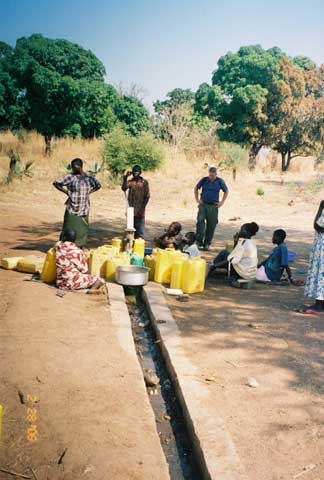 Waiting for Water
Waiting for WaterIf I understand it correctly, there were two boreholes within "reasonable" walking distance of Lui. This was the one we passed on our Ash Wednesday walk.
People were gathered all around it. And I noticed lots of water containers placed all about. Later I learned that it’s because of the drought. Women would come to the well, hoping to find water, but there was none. So they would just leave their container and go on about other business, coming back later in hopes of water.
What’s the deal with the water? It took me a long time to understand it, and I’m not really sure I do even now, but at least I understand more than I did before.
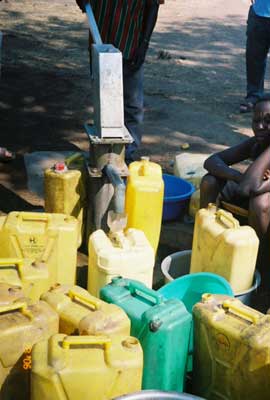 Yes, there are a few wells in Lui. Not many, mind you. They are spread about 5 miles apart. Try to imagine that, my U.S. friends. Try to imagine having to walk 5 miles to get enough water for your family to get through a day … or two … or three.
Yes, there are a few wells in Lui. Not many, mind you. They are spread about 5 miles apart. Try to imagine that, my U.S. friends. Try to imagine having to walk 5 miles to get enough water for your family to get through a day … or two … or three.Then add this: The drought in Lui is so severe that even the wells are running dry. You walk half the morning to get to a well. But the well isn’t producing any water. You have to wait until the water can slowly trickle through the granite substrate and come trickling into the bottom of the well again.
Meanwhile, many other peoples’ water containers sit gathered around the well … waiting and hoping …
Finally, the water starts flowing again.
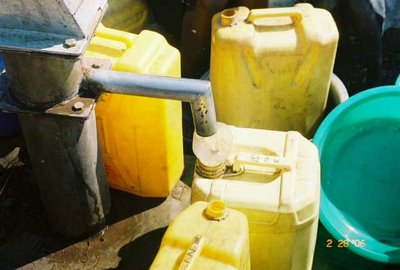 Maybe you’ll be one of the lucky ones who gets her water container filled. Maybe your water will be clean. Maybe – just maybe! – you’ll get water that is not contaminated with cholera or any of the other many water-borne diseases in Lui.
Maybe you’ll be one of the lucky ones who gets her water container filled. Maybe your water will be clean. Maybe – just maybe! – you’ll get water that is not contaminated with cholera or any of the other many water-borne diseases in Lui.I cannot tell you how many women I met who were spending their entire day trying to collect water for their family. It was breathtaking to me. The lucky few women who have (supposedly) “paying” jobs at Samaritan’s Purse hospital, who would spent their entire day off walking back and forth to one of the wells, hoping to collect enough water to take care of their family during the next week.
And I saw this a lot, too: We would be coming home in our truck at night – maybe 8:00 p.m. or later. And I would see women walking along the track toward the well. Why? Because it’s cooler in the night, when you have nothing but the meager moon to light your path. But at least you do not have to walk in the 110-degree heat that greets every day in Lui!
I was overwhelmed by the struggle it takes merely to survive in Lui. Remember Maslow’s pyramid of the basics of human existence? Water. Food. Shelter. Merely getting water could kill me in Lui. It’s that difficult.
And here’s another complication. When our Bishop first explained the water situation to my parish, before I made the trip to Lui, he stressed the need for water and wells and boreholes. We all wanted to do something to dig deeper wells. But then he had to explain to us the Lui hesitance to dig deeper wells: They are afraid to dig deeper wells, because the oil is so near the earth that they might accidentally strike oil. And our western minds said, “Yee-haw! ‘Black gold!’ ‘Texas tea!’” But no. One of the significant reasons that the northern Khartoum government waged war against the South for 2 decades was because southern Sudan has so many natural resources, and the Khartoum government apparently covets those resources. So if you try to drill a deep well in Lui to provide water for a village – but accidentally hit an oil well – there’s a risk that the Khartoum government will learn about it, and come in and destroy your village and your family and neighbors. So – weird as it seems to me – digging a deeper well is actually a risk and one that you probably do not want to endure.
So the people die of thirst, because digging deep wells might bring renewed warfare due to the lust for oil. How sick is that??!!??
And what will it take to quench this people’s thirst?
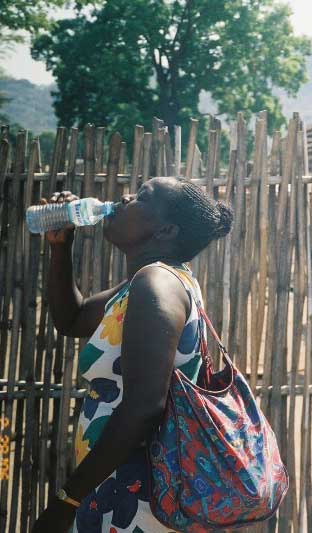
I’ve talked before about how the people of Lui are hesitant to build or re-build with mud structures, opting to build of grass instead. Building in grass is faster, and less expensive.
These are some grass bundles, harvested and waiting for buyers.
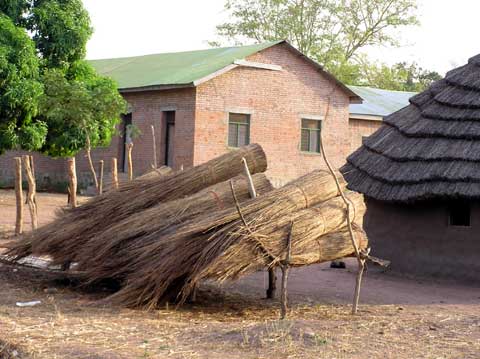
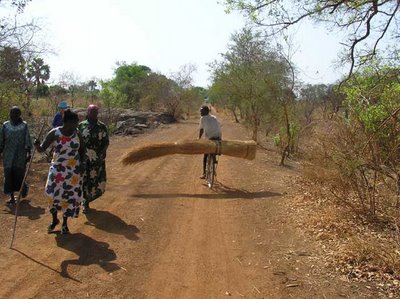 It was pretty fun to see this sight -- a guy riding along the road on his bicycle with grass bundles as cargo. But that also led me to wonder what's going on here. I would have thought that -- with these tall grasses so plentiful throughout Lui -- everyone would just go into the brush and cut his/her own grasses to make roofs or shelters. Not so! I do not understand the reason, but I gathered this information: Most people do not go out and cut their own grass. Instead, they have to buy it. And it is expensive, by Sudanese standards: something like $1US per bundle. And it takes something like 100 bundles to make a roof. So, in fact, the grass cutters are upper-end businessmen.
It was pretty fun to see this sight -- a guy riding along the road on his bicycle with grass bundles as cargo. But that also led me to wonder what's going on here. I would have thought that -- with these tall grasses so plentiful throughout Lui -- everyone would just go into the brush and cut his/her own grasses to make roofs or shelters. Not so! I do not understand the reason, but I gathered this information: Most people do not go out and cut their own grass. Instead, they have to buy it. And it is expensive, by Sudanese standards: something like $1US per bundle. And it takes something like 100 bundles to make a roof. So, in fact, the grass cutters are upper-end businessmen.My U.S. brain just overloads at that point. I do not understand how such a basic building material -- which is in such great supply in Lui -- can be so difficult for most people to afford. Maybe one of the next travelers to Lui can help me (and us) understand that dynamic.
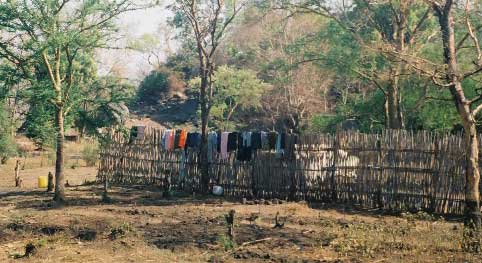 As we walked the road, we noticed that this is how clothes are dried. I never did see the process for washing clothes. But this is how they are dried all around Lui: draped over bamboo fences.
As we walked the road, we noticed that this is how clothes are dried. I never did see the process for washing clothes. But this is how they are dried all around Lui: draped over bamboo fences.
 All around Lui, we would see sights like this. The terrain was very scrubby brush. But then, rising out of nowhere, there would be this awesome mango tree. They created the most wonderful, cool shade. People often gathered under the mango trees.
All around Lui, we would see sights like this. The terrain was very scrubby brush. But then, rising out of nowhere, there would be this awesome mango tree. They created the most wonderful, cool shade. People often gathered under the mango trees. Hmmmmmmm…. I need to think of a good reason to include this photograph – preferably some profound theological insight. Let’s see .. some insight into the Garden of Eden and how Adam and Eve covered their nakedness with big leaves? … Well, I can’t come up with one. This just made me laugh. In this scrubby landscape, there were some trees that made huge leaves. And this one was just big enough to serve as a fig-leaf for me.
Hmmmmmmm…. I need to think of a good reason to include this photograph – preferably some profound theological insight. Let’s see .. some insight into the Garden of Eden and how Adam and Eve covered their nakedness with big leaves? … Well, I can’t come up with one. This just made me laugh. In this scrubby landscape, there were some trees that made huge leaves. And this one was just big enough to serve as a fig-leaf for me.
It took me quite a while in Lui to get my head around the role of the Mother's Union. At one point, checking my understanding with one of my fellow travellers, I asked, "So they're kinda like the Altar Guild ... but on steroids?" No. More. Much more. They don't merely take care of the cathedral and parishes. They take care of the community. They establish schools. And, apparently, they try to find better, more efficient ways for women to provide water and food for their families. I still don't quite "get it." But I do "get" that they are a force to be reckoned with ... and a major force for good.
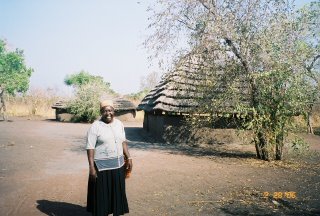
The Mother’s Union is working very hard to establish schools – not just for children, but also for adults (and especially women). This is one of the adult literacy centers they have built.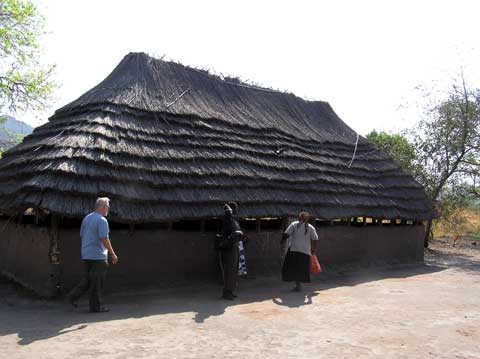
It is designed partilarly for the women of Lui. Here, Father Bob is at left, and Mama Margaret is at the right. I can't remember the name of the priest in the center.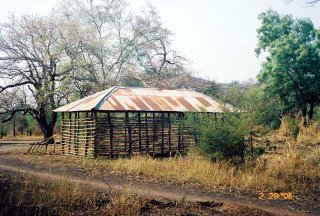
And this is one of the children’s schools. If I understood them correctly, this is for middle-school students. And our kids think they have it rough!
This is another of the “classrooms.” Class is not in session now, but our friend Rebekah took a breather here. 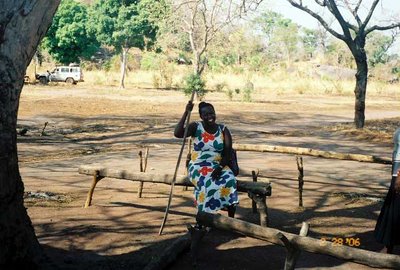
Note the style of these seats. I saw these all around Lui -- especially in schools and in church buildings. They drive a forked branch into the earth, then stretch a limb across those supports, and – voila! – a bench or seat.
This is a sight we saw all over Lui. It took me several days, though, to understand what I was seeing.
Throughout Lui, the granite outcroppings are everywhere. If you have seen Georgia’s Stone Mountain, you’ll know what I mean. There are granite outcroppings all over the place. And that’s one of the challenges of traveling by “truck”: You are forever climbing and descending on those rocky outcroppings.
And as we traveled these Lui roads, I would see those strange piles of rock. Piles of huge rocks, big rocks, smaller rocks, and tiny rocks. It took a while – and some talking with our Lui hosts – before I understood what I was seeing.
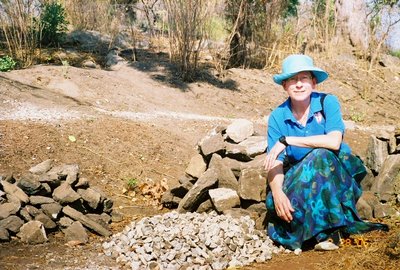
They use these rocks as building materials – to “chink in” their mud or plaster structures.
But how do they create that gravel? They take shards from the granite mountains and outcrops, chisel them down to "merely" huge rocks, and pound them down to big rocks, then pound them into small rocks, then finally pound them down to gravel. Mind you, they’re doing all of this by hand!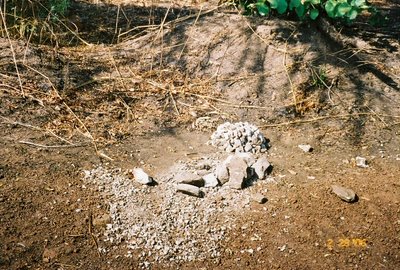 They do it by the side of the road. Why? Maybe because it’s easier to transport them? I don’t know. I just know that I saw these piles all over Lui. Most of the time, I saw men at work, pounding the rocks into smaller and smaller rocks.
They do it by the side of the road. Why? Maybe because it’s easier to transport them? I don’t know. I just know that I saw these piles all over Lui. Most of the time, I saw men at work, pounding the rocks into smaller and smaller rocks.



